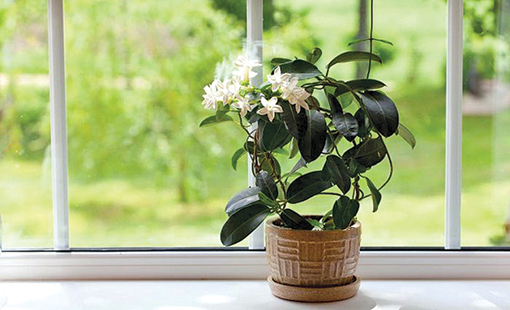
Jasmine as a Houseplant
If winter blooms and sweet, nighttime fragrance appeal to your senses, consider growing jasmine indoors. Not all jasmine flowers are fragrant, but Jasminum polyanthum, the variety commonly used when growing jasmine indoors, has a sweet aroma that is particularly fragrant at night.
Care
Indoor jasmine plants actually benefit from spending time outdoors. In summer, locate your jasmine plants in a partly sunny spot to encourage robust growth.
Jasmine flowers are set during another outdoor stretch of six weeks in the cool of autumn. This encourages buds to form for the typical February bloom of jasmine flowers. If indoor jasmine plants don’t bloom, it may be they’ve not been exposed to cool enough temperatures.
Back inside, place near a south window when growing jasmine indoors. Indoor jasmine plants are vigorous climbers and need an indoor trellis or support for their vigorous growth.
Air & Light Requirements
Cool temperatures and the right location in a well-lit room or sunny window is important for this plant. Good air circulation helps promote showy white, winter blooms when growing jasmine indoors. The plant can tolerate as much as four hours per day of direct sunlight, from late spring through fall. Decrease direct sunlight in winter.
Soil
Soil for indoor jasmine plants should be porous and may be modified with bark, coir or other organic materials. The soil mixture should remain moist throughout the year, but not soggy. Less water is needed during the resting period following bloom decline.
Fertilizer
Care of indoor jasmine includes fertilization with a weakened houseplant food throughout the growing season. High phosphorus fertilizer prolongs the length of bloom time.
Pruning
Pruning is necessary when growing jasmine indoors. As you’re learning how to care for a jasmine houseplant, you may find it getting out of hand if you don’t prune regularly to keep it under control. Prune heavily at the beginning of the spring growing season while training the twining vine to a support.
Common Pests & Diseases
White, cottony masses under leaves and on stems may indicate that mealybugs have taken up residence on your plant. Remove as many as possible when pruning. Use a cotton swab dipped in alcohol to remove any masses left when pruning is finished.
Indoor jasmine plants have a long lifespan when cared for properly. Repot in spring. Prune the roots when moving to fresh soil, as needed.
Information courtesy of GardeningKnowHow.com

 Adams Fairacre Farms
Adams Fairacre Farms